
Advertisement
Beekeepers and experts have hailed the vaccine as a breakthrough – a first step towards controlling more common viruses and pests that have decimated bee populations.
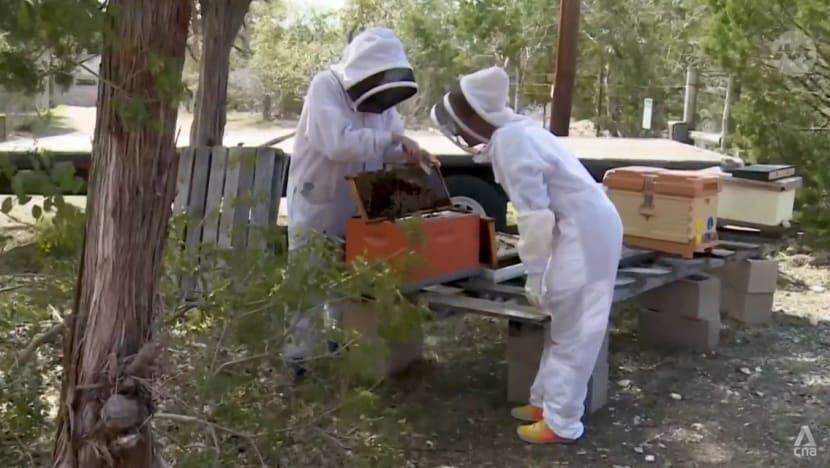
Master beekeeper Tanya Phillips and CNA correspondent Toni Waterman, both wearing beesuits, look at a hive on Ms Philips’ bee farm in Texas.
AUSTIN, Texas: Honeybees help to pollinate about one-third of the world’s food crops, but their populations have been in steep decline for decades.
Science is now stepping in to offer these bees a fighting chance.
Earlier this year, the United States Department of Agriculture gave conditional approval for the world’s first vaccine for honeybees, which will boost their immunity against a disease that routinely ravages colonies.
Developed by biotech firm Dalan Animal Health, the vaccine protects against American foulbrood – an aggressive, fast-spreading bacteria that targets honeybee larvae and can wipe out an entire colony in just three weeks.
There is no cure at the moment and the only remedy is to destroy and burn infected colonies, along with contaminated equipment, to prevent further spread.
This new vaccine aims to nip the disease in the bud.
It contains some of the bacteria in the form of a sugar jelly, which is fed to the queen by worker bees. Once ingested, the vaccine travels to the queen bee’s ovaries, where immunity is then passed to her offspring.
Beekeepers and experts have hailed it as a breakthrough – a first step towards controlling more common viruses and pests that have decimated bee populations.
IMPACT OF DECLINING BEE POPULATIONS
Since the 1940s, the number of honeybee hives has more than halved in the US. Similar declines have been recorded throughout Europe and Asia, posing a severe threat to global food security.
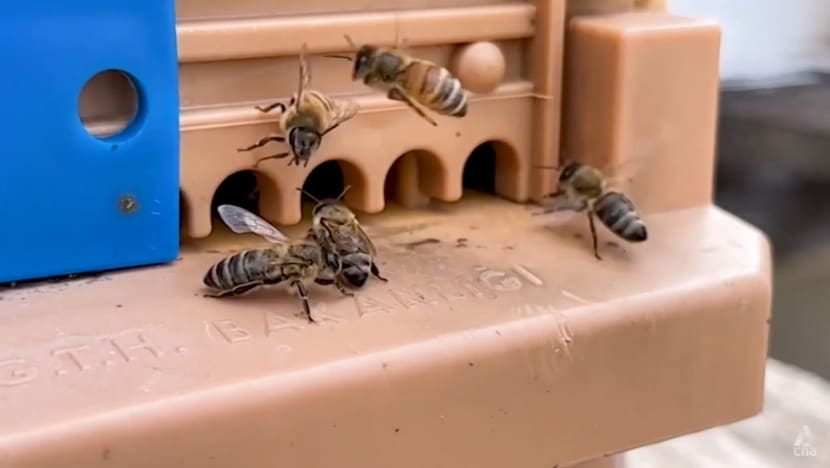
“There’s no replacement for honeybees in terms of the pollination services they provide for a growing human population,” said Dr Juliana Rangel, associate professor of apiculture at Texas A&M University.
“So if we were able to create any kind of antiviral immune priming similar to what is being done with American foulbrood, that would be an incredible breakthrough.”
The US Food and Drug Administration (FDA) said the greatest importance of honeybees is their work as crop pollinators, putting the agricultural benefit at an estimated 10 to 20 times the total value of honey and beeswax.
Foods under threat from a deteriorating honeybee population include apples, melons, cranberries, pumpkins, squash, broccoli and almonds, according to the FDA.
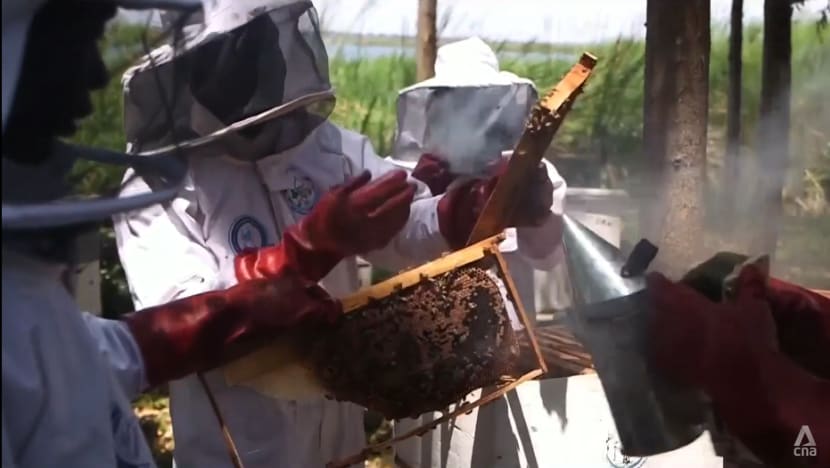
Apart from diseases, honeybees are susceptible to parasites, pathogens, agricultural pesticides and habitat loss.
Climate change is also emerging as a serious threat to honeybees.
IMPACT OF CLIMATE CHANGE ON BEES
Outside of feeding their bees, insulating their hives and conducting regular checks, there is very little beekeepers can do to protect their colonies from the harmful impacts of climate change.
Ms Tanya Phillips, who has been a master beekeeper for more than a decade, knows this all too well.
An unseasonably frigid winter this year and an excessively hot and dry summer last year had slowly starved hundreds of thousands of her bees to death.
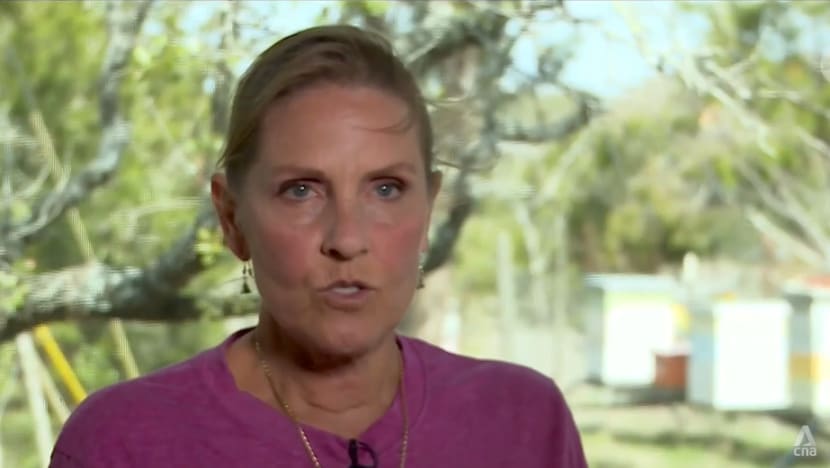
“All the spring flowers, which is what the bees in Texas eat, all of them died. It was by far the worst year for bees,” said Ms Phillips, as she showed CNA hollowed-out hive carcasses piled up in her yard.
“I lost about … I stopped counting when it passed 50 colonies. I just stopped counting. It was just getting sad.”
A typical honeybee hive contains about 50,000 to 80,000 bees.
Ms Phillps, who owns Texas Honey Bee Farm, said climate change is the biggest challenge her bees are facing.
She routinely checks the rest of her beehives across her sprawling farm in Austin, Texas, to ensure that her bees are healthy, producing honey and free from diseases.
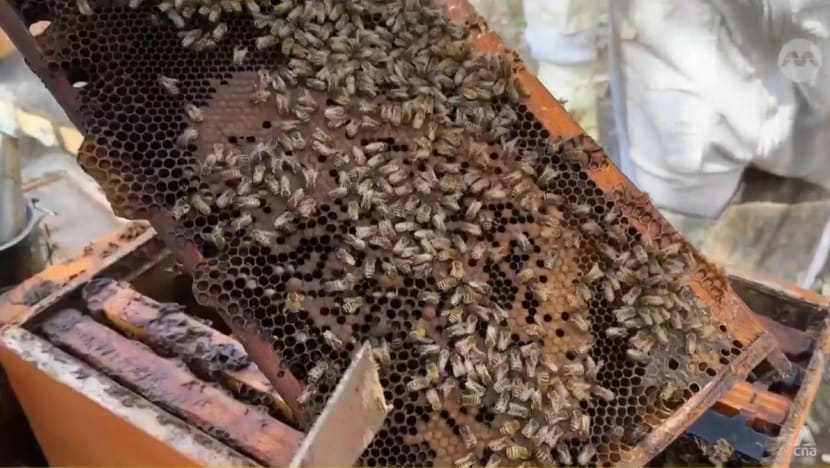
Beyond fighting off American foulbrood, Dalan Animal Health hopes that its vaccine can help honeybees better adapt to other stressors like climate change.
“If you are starving, if you are poisoned, then it’s much easier to get sick,” said the firm’s chief scientific officer Dalial Freitak.
“So our hope is that having vaccination available for insects will provide this cushion. If something is taken care of, they have more resources available to manage the other stressors.”
Ms Freitak said the company is looking to release the vaccine to commercial beekeepers later this year, giving bees – which many argue are the most important insects on Earth – better odds of survival.


